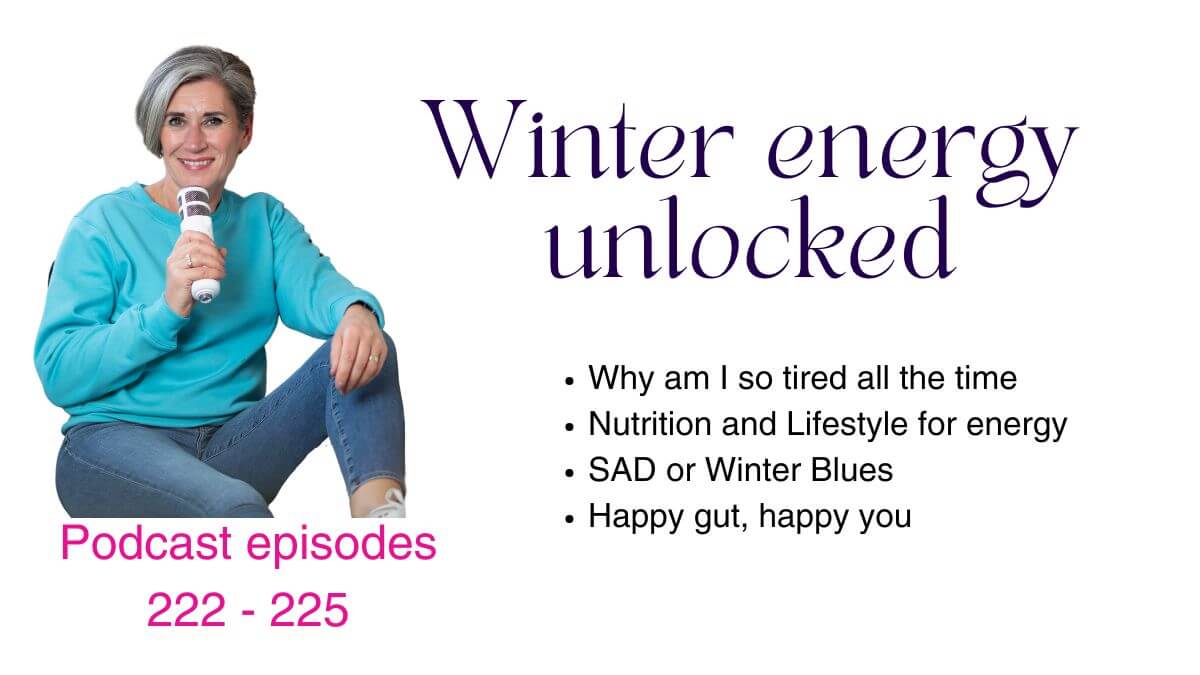As the winter months draw in, many of us may be feeling less active and have less energy. This can be compounded in mid-life when the temptation is to hide yourself away from the world. And combine this with lower mood generally associated with winter months and it can lead to low mood and even depression.
On this months podcast I will be exploring different ways to boost energy and motivation, and the factors that might be driving our lower mood.
- Why am I so tired all the time
- Nutrition and Lifestyle for energy
- SAD or Winter Blues
- Happy gut, healthy you!
Uncovering the route cause of tiredness
Why are we so tired all the time? Particularly in mid-life?
During mid-life energy levels can often drop and this is a multi-factored issue, that cannot be fixed by a magic pill. Many clients I speak to site feeling fatigued, low energy or just blooming knackered as a big problem.
The vicious cycle
Low energy can seriously affect their quality of life and because we need energy and motivation to cook, go shopping and exercise it can become a vicious circle. With clients complaining that they are too tired to cook a good meal, but then feel awful because they are not eating well, and they are putting on weight because their diet is bad and they are not exercising and they feel bad about themselves, so they eat chocolate to make themselves feel better, which just makes them feel worse.
Does this sound familiar?
It’s hard to break free of the cycle and uncovering the root cause can be difficult, as it is often a combination of all the different factors. For me the key is finding one area that wils provide a quick win.
Life is complicated
During mid-life a woman’s hormones will be fluctuating which can affect mood. Added to this they may have a busy work schedule, combined with potentially children also going through hormonal changes, and elderly parents. This can be the busiest and most demanding time of a woman’s life, and then throw into the mix the aching joints, brain fog and poor quality sleep that are just some of the symptoms associated with perimenopause and it’s no wonder that fatigue becomes part of the picture.

It’s not okay to suffer in silence, and often the first step is to simply admit that you are struggling and look to see where you can get support from family and friends. I see clients who are juggling far too much, and almost feel like it is a sign of weakness to ask for help – it’s not. Your family and friends love you and they want to help you, they don’t want you to struggle. Fatigue is not just physical, it’s emotional too.
One change has a ripple effect
The next step is to look at diet and lifestyle and see what small changes can be made. Often something as simple as stopping drinking caffeine in the afternoon can have a multiplying effect:
- Improve sleep, as caffeine is a stimulant
- Improve hydration as caffeine acts as a diuretic
- Improve energy – from better quality sleep
- Improve efficient elimination – from being better hydrated
Then the further effects might be that you are drinking a herbal tea, which has a positive effect on your health. You have more energy so you feel like meeting friends or going to the gym, which improves your mood. Or you decide to cook rather than getting a take-away. See how one simple change can have a ripple effect.
The overwhelm is real, and taking that away and allowing yourself to make just one simple change can be all that you need.
To listen to this podcast episode 222 released on 6th November click the link below
Food is fuel – never forget that!
You are in control of what you eat, and what you eat is providing your body with the fuel to power your day. I think that we sometimes forget that.
Fueling your day

You are busy, you have a lot to get through each day, and yet many of us forget to provide enough fuel for the day ahead. When you are busy you can find yourself rushing from one task to the next, and providing a meal for yourself might be very low on the list. Then we wonder why we are feeling tired.
I ask you – what would you say to someone you loved if they ate in the same way that you do? If you would be happy with it, then great, your diet is probably balanced and nutritious, but if you wouldn’t then I ask you – why are you feeding it to yourself and expecting a different response?
Start by keeping a diary of what you eat, you can just take a quick photo if that works for you. Then spend a few moments at the end of each day looking at what fuel that provided. I am not suggesting counting calories, as I don’t believe that is helpful, the things I look for are:
- Is there adequate protein – it’s the building blocks of everything in our body
- Is there lots of colour – a wide range of vegetables and fruits provide nutrients for energy
- Is there lots of beige – processed and beige foods are generally nutrient poor, so we want to limit those in our diet.
- Is there much variety – are you eating the same foods on repeat, meaning you are getting the same nutrients every day. Variety is they key to making sure you get all your body needs.
It’s easy to kid ourselves that we eating better than we are. So by documenting it you might just find out why you’ve been feeling tired all the time!
Lifestyle hacks for energy in winter months
When it was colder and darker, evolutionarily, we would have spent less time moving around. While we don’t actually hibernate, we would naturally have slowed down. But modern life isn’t like that, so we need to find simple ways to keep our energy high during those cold, dark months.
Getting daylight in the morning is key, it helps reset our natural circadian rhythm and helps boost energy. On dry days why not wrap up and take your morning drink outside? Or can you walk before work, or even at lunchtime. This will have a double benefit as you will be getting some movement as well.
It can be harder to get up in the winter months so having a good morning routine is key. Set your alarm a little earlier and add some stretching to your morning routine can be really helpful in improving energy levels. There are lots of free apps available and just 5 or 10 minutes each day will help. Many of us move less during the colder months, so starting the day as you mean to go on can be a great motivator.
To listen to this podcast episode 223 released on 13th November click the link below
Seasonal Affective Disorder or Winter Blues
Whilst many of us feel our mood is lower in winter months, some people are severely affected with a condition known as SAD (Seasonal Affective Disorder), which is major depression that has seasonal patterns. Winter Blues is something that might affect many of us from time to time, but is less severe and happens on occasions rather than throughout the winter months.
Light for energy and mood

During the winter months we may find that we move less, have increased tiredness, and crave sugary or carb rich foods. This is all part of our evolution, we needed to move less as foods were less abundant, and we would stock up our own fat reserves to help us last through those winter months. But this isn’t needed anymore, and so whilst we need to respect that we may slow down a little, we also need to work to keep things more balanced
Light exposure can significantly improve our mood and general feeling of wellbeing. As mentioned previously, morning light can have a positive impact on our energy levels as well as boost mood. Some people find that using a light box can help boost their mood, and there are many available that you can sit in front of for a few minutes in the morning, or add to your desk to improve light levels throughout the day.
We are social beings
We are not designed to spend our time alone, so if you are inclined to stay in during the winter months try finding something that will help get you out of the house and interacting with people. Being part of clubs and societies have a positive impact on our mood, and if you are moving at the same time then even better. Why not commit to something that you have always wanted to do this winter?
Nutrients to reduce the winter blues
Vitamin D has a direct impact on our mood, and our immune system, and for those of us that live in the northern hemisphere, we do not have enough natural light to boost our levels in winter months, meaning that they drop significantly. This has such an impact on our health that the NHS now recommends that everyone takes a supplement during the winter months.
I am a huge advocate of eating seasonally and locally, and this can be a little more challenging in winter months, but it is still possible. And many of the seasonal foods are great for boosting energy, hardy greens such as cabbage and sprouts are a great source of magnesium, as well as being good sources of B vitamins which work to improve energy levels and motivation.
To help you keep enough variety, and get all the colours of the rainbow daily, your freezer is a perfect friend in winter months. Top up your diet with goodies such as frozen berries. All berries are highly antioxidant and when frozen at source, much of the nutrients are protected.
To listen to this podcast episode 224 released on 20th November click the link below
Gut health and energy
Our brain and our guts are directly linked via the vagus nerve. This nerve sends signals up and down all day and night and interestingly around 70% of the signals are going from the gut to the brain. Which is why gut health is so key when we are thinking about mood.
Perimenopause and low mood
Low mood and low motivation are common symptoms in perimenopause, and whilst fluctuating hormones definitely have an impact, we cannot ignore the significant role that our gut health also plays in energy and motivation. Serotonin, the hormone that is key in mood, is mostly made in our gut, so if our gut health isn’t good will we be making enough? Modern medicines prescribed to improve mood are known collectively as SSRi’s and they work to increase the amount of available serotonin in the body, but as a nutritional therapist I am working to help ensure that you are making enough.
Our happy hormone is made in the gut
During the winter months we may find that we move less, have increased tiredness, and crave sugary or carb rich foods. This is all part of our evolution, we needed to move less as foods were less abundant, and we would stock up our own fat reserves to help us last through those winter months. But this isn’t needed anymore, and so whilst we need to respect that we may slow down a little, we also need to work to keep things more balanced

Every client is different, and their symptoms and history is unique, and there are supplements and testing that we can offer to really personalise their protocol, there are some simple things that we can all do to look after our gut health:
- Stop eating all the time – if you are digesting food you are not doing anything else, simply stopping eating between meals can allow the space in your gut to make hormones such as serotonin
- Eat more fibre – our health gut bacteria love fibre, so including plenty of fibre in your diet is key to a healthy happy gut.
- Efficient elimination – a good and healthy stool movement each day to get rid of any waste or toxins in the body
- Address the cause – if certain foods are causing digestive issues then stop eating them – it’s simple and you control what you eat.
- Probiotic food – include foods that will help feed and repopulate your gut microbiome such as yoghurt, sauerkraut and kimchi.
- Slow down when eating – simply chewing your food better and making sure you are sitting at the table can have a big impact on how well your body digests each meal.
By following these tips, and listening to the podcast, you will pick up a wide range of suggestions that will help you improve your energy and motivation, and ultimately your mood. This is not a linear process, it can sometimes feel more like a roller coaster journey. When you are starting out, just pick one or two things that you can implement quickly and easily, and then add new things as you feel confident.
And don’t beat yourself up if you have an off day, just get back on track the next day, no-on is perfect!
To listen to this podcast episode 225 released on 27th November click the link below
Did you enjoy the topic of these episodes, have you got any feedback or questions? Please reach out to me via my social media channels, I’d love to hear from you. And don’t forget to subscribe to the podcast so that you don’t miss an episode.
My links
A note about our sponsor
Revive Active, Ireland’s leading Super Supplement Brand, we are proud to have them as sponsors of this podcast as their formulas stand out as a powerhouse of premium ingredients, working together in perfect harmony to bring you optimum benefits.
Revive Active is committed to selecting components that not only enhance your vitality but also cater to your specific needs. Every ingredient is carefully chosen for its efficacy and is supported by rigorous scientific research. Revive Active believes in transparency. What you see on the label is what you get – no hidden ingredients or undisclosed fillers, binders, caffeine, or stimulants. Convenience meets effectiveness in every sachet, from radiant skin to boosted energy levels, each formula is designed to enhance your overall well-being.
My favourites from their range
REVIVE ACTIVE is a powerhouse of 26 active ingredients—your essential replenishment for what life takes out with the support of HERO ingredients like CoQ10 for cellular energy, Citrulline DL Malate to fight fatigue and support heart health, and L-Arginine for active blood flow.
Meet MASTERMIND, your brain’s secret weapon! This specially formulated supplement supports brain function with a potent mix of 7 vitamins, 1 mineral, Omega 3 DHA, Uridine, and Choline—all in one handy sachet. Enhance mental focus, and beat that mid afternoon slump without interfering with your sleep, this is your maximum productivity and focus tool. Plus, it’s Vegetarian, Gluten-Free, and Halal Certified.
BEAUTY COMPLEX, one of the award-winning super supplements, boasts 8 potent ingredients in one easy, convenient sachet. Featuring Type 1 Marine Collagen, Hyaluronic Acid, Phytoceramides and Biotin, the synergy of these HERO ingredients goes beyond aesthetics, aiming to reduce visible signs of aging and enhance your overall look and feel. Beauty, indeed, starts from within.
Newly formulated MENO ACTIVE—Is a 3-in-1 super supplement, designed to support you during this transformative journey of change. With a daily sachet containing 10 vitamins, 7 minerals, 4 digestive enzymes AND 3 strains of live bacteria, accompanied with a botanicals capsule with targeted nutrients such as sage and ashwagandha alogn with an Omega 3 capsule. Meno Active is your empathetic companion for a smoother transition.
Want to know more about ways to work with me?
There are many ways that you can work with me to balance your hormones and improve your health and wellbeing.
On Facebook the Fab Female Nutrition Club is a wonderful FREE community where I offer lots of support and advice on female health and wellbeing. I also love to cook and create recipes and I’ll often be seen in the group cooking live and sharing all the wonderful health benefits of the ingredients used.
My Fab Female Nutrition Membership sits alongside the free club, but offers you lots of resources and group coaching with me. The hub has the full recipe book that is constantly being updated, the 5 elements of health containing resources and guides to help support you in your health journey. And 6 group coaching calls a year, plus access to other member benefits such as discounts from group programs.
A few times a year I work with groups of ladies to transform their health and wellbeing. Appropriately called The Transformation Program it can help with many differing issues and we have had hugely impressive results – including up to 100% reduction in symptoms. If you suffer with IBS, fatigue, inflammation, hormonal imbalances or just want to spend some time concentrating on your health and wellbeing they are fabulous value and great fun.
If you feel like you need a more bespoke option, then my 1:1 coaching and testing is for you. We will concentrate on your specific needs creating nutritional protocols that support your health goals. We take a full health history, then tailor testing to help create and refine protocols so that you learn about your body and how to support it. I will be with you every step of the way to guide you and ensure that you realise your true health potential. Find out more here.

